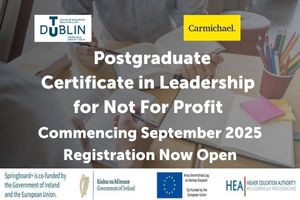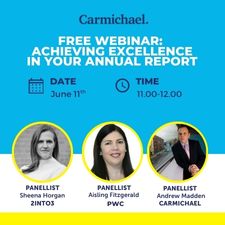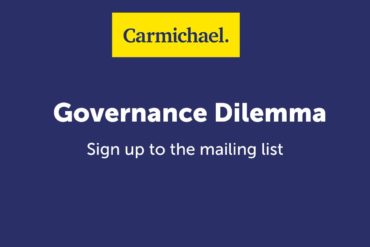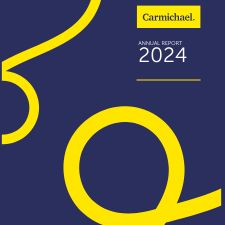We are delighted to announce the Postgraduate Certificate in Leadership for Not For Profit which has been designed in partnership with Carmichael and TU Dublin.
The programme runs over one-year, from September 2025 to May 2026, fully online through TU Dublin. It is a 30 credit (ECTS) Postgraduate Certificate at Level 9.
Find out more information click here.
Information session (online) June 25th 8.30am. Register here.
This course is funded under the Springboard+ initiative in 2025. Applications should be made via the Springboard+ website, subject to meeting the eligibility criteria.
For further information, please contact the team at springboard@tudublin.ie.
Transparency and accountability are vital for any nonprofit to build and maintain public trust – Carmichael
– Carmichael opens applications for the Good Governance Awards 2025 –
Transparency and accountability are vital for any nonprofit to build and maintain public trust. That’s according to Carmichael, who launched the opening of applications for their Good Governance Awards 2025 today (28.05.25).
Now in its tenth year, the Good Governance Awards recognise and encourage adherence to responsible governance and transparent reporting by nonprofits in Ireland. Each year, more than 100 nonprofit organisations enter their annual report and financial statements into the awards to be assessed under the criteria of transparency, governance, strategy, and financial information. In 2024, the 7 Good Governance Awards Winners ranged from Chronic Pain Ireland, a small charity that supports, educates and advocates for people with chronic pain to Trócaire, an international social justice organisation with an annual income of more than €93 million.
Commenting after the 2024 Awards, Christina Donnelly, Executive Director of Chronic Pain Ireland who were winners of Category 1 said “We were absolutely delighted to receive this award, which recognised our strong commitment to good governance as the foundation for accountability, trust, and effective operations, especially as a small charity with limited resources. This recognition affirms the transparency and responsible leadership that guides everything we do at Chronic Pain Ireland. We were deeply grateful to the judges, Carmichael, and the organisers, and especially proud of our dedicated Board, staff, and volunteers whose commitment made this achievement possible.”
Speaking today, Diarmaid Ó Corrbuí, CEO of Carmichael and Founder of the Good Governance Awards, said, “The Good Governance Awards raise the quality of corporate governance in our sector by encouraging higher standards of good practice in annual reports. Expert feedback is provided to all entrants on how to improve the quality of their annual reports. This helps to ensure our sector is meeting best practice, constantly improving and communicating appropriately to its stakeholders.
“This year we are especially encouraging applications from the diverse range of organisations working in the nonprofit sector. We welcome applications from all areas – from arts and sports to homeless services and youth organisations. Due to the growing profile of the Good Governance Awards, we expect to see our highest number of applications ever this year.”
How to Enter
Any nonprofit organisation in Ireland, whether a charity, Company Limited by Guarantee, sports club or social enterprise, can enter the Awards. There are seven categories for the awards based on the annual turnover of the organisation:
- Category 1: For organisations with an annual turnover of less than €100,000
- Category 2: For organisations with an annual turnover of between €100,000 and €250.000.
- Category 3: For organisations with an annual turnover of over €250,000 and under €750,000.
- Category 4: For organisations with an annual turnover of over €750,000 and under €2.5 million.
- Category 5: For organisations with an annual turnover of over €2.5 million and under €10 million
- Category 6: For organisations with an annual turnover of over €10 million and under €50 million
- Category 7: For organisations with an annual turnover of over €50 million.
Details on the entry criteria and categories; the judging panel; how to enter; and other resources such as annual report templates are available at: www.goodgovernanceawards.ie or enter here.
Entries closed 11th September 2025. Awards ceremony takes place Wednesday 19th November.
Contact: Martha Boyle, Good Governance Awards Coordinator
Email: martha@carmichaelireland.ie
Download press release here.
As part of the launch of the 10th Good Governance Awards, Carmichael is hosting a free webinar on “Achieving excellence in your annual report.”
Date: 11th June 2025, 11.00am-12.00pm
This 60 minute webinar will include:
- Preparing for excellence; the structure and process to deliver an excellent annual report
- An auditor’s perspective on what is required to deliver an excellent report and the key reporting requirements under Charities SORP
- How to move from a good annual report to an excellent annual report – what the assessors and judges in the Good Governance Awards are looking for?
Speakers:
Sheena Horgan Director Advisory Services, 2into3
Aisling Fitzgerald, Director PwC, Head of Not-for-Profit Assurance Practice
Andrew Madden, Head of Training, Consultancy & Communications, Carmichael
Register here: https://us02web.zoom.us/webinar/register/WN_mZI82VA6TXelQdyA7p3t_A
If you would like to join the mailing list, sign up here.
Read the latest May 2025 dilemma here.
For an example of a previous Governance Dilemma, see below:
Governance Dilemma
Mark has just returned from a long holiday during which he deliberately ‘dropped out of contact’ with his work life, which included his board role on a not-for-profit company which is also a registered charity. The board meets every second month and he missed a meeting but wasn’t overly concerned as he had spoken with the chairperson before arranging the holiday and received approval for an absence. Last night he received the notice for the next board meeting and was surprised to see that apart from himself and the chairperson all the other board member names were new. The minutes are short and simply record that the board met and received reports about the company’s performance. There is no record of anyone resigning or of any major change. Mark rang the chairperson and asked what had happened. Apparently, there was a big disagreement at the last board meeting, so the chairperson asked the other directors to leave and replaced them with some ‘trusted friends’. Mark had got on well with his board colleagues and, after his talk with the chairperson, – which left him as ill-informed as he was beforehand – Mark called his closest friend from among his former colleagues. The friend said that he and the other directors had disagreed with a proposal but that they couldn’t discuss it as they were bound by confidentiality. The friend confirmed that the chairperson had asked him to leave and suggested that it would have been untenable to stay after the chairperson requested his resignation; however, he did say that there was nothing for Mark to be concerned about and that it was just a difference of opinion about where the company should be headed. The papers for the coming meeting are fairly bland and have a lot of operational and background papers that will be helpful for the four new directors. There is no mention of any new initiative. There is nothing that gives Mark a clue about what might have happened or what to do next. What should he do?
Clodagh O’Reilly’s response:
I should imagine it was a huge shock for Mark to return from holidays and discover there was an almost entirely new group of directors around the board table!
It is clear that the minutes of the previous board meeting are insufficient and do not contain the key details of discussions and decisions made at the previous board meeting. The minutes of meetings should reflect the discussion and record decisions. Mark, as a director, is entitled, and furthermore, required to know the details of the discussions and what led to the resignation/termination of the directors at the previous meeting. This should be his first step, going back to the chair to request a full disclosure of the new proposal and the discussion that followed at the meeting. Without this information, his capacity to make informed decisions going forward will be hampered. Mark will need to evaluate if the contentious new project deviates from the mission of the organisation. It may push the charity to operate beyond its approved objectives as per the constitution, which would jeopardize its charitable status and indeed, the limited liability of the directors. If Mark is not provided with this information to his satisfaction, which allows him to make a full risk assessment of the new proposal, it is difficult to see how his position on the board could remain tenable. The ‘bland’ papers for the upcoming board meeting will further heighten his concerns as they seemingly, perhaps intentionally, are seeking to sanitize the previous disagreements. If his concerns are not alleviated and the information requested is not satisfactorily provided, he should consider taking independent legal advice and/or making a report to the charity regulator highlighting the governance breaches.
Mark should revert to the constitution and board procedures to review the process for the removal and approval of directors. It seems unlikely this process has been appropriately followed, either for the dismissal of the previous directors, or the appointment of the new directors. Was there a quorum present to elect the new directors, if all other directors had resigned? Furthermore, the fact that the new directors are ‘trusted friends’ of the chair, suggests there may be a conflict of interest and a lack of independence.
Ultimately, Mark, as a charity trustee, on behalf of all the stakeholders, particularly the beneficiaries, has an obligation to ensure good governance practices are in place and must take the necessary steps.
Patrick Downes’ Response:
Mark has every reason to be concerned. What has happened here is highly unusual and raises serious governance red flags. A Chair does not have the authority to simply dismiss board members and replace them with “trusted friends” without following due process. This situation demands immediate scrutiny.
Mark’s first step should be to establish exactly what happened. The sudden replacement of an entire board, with no formal resignations or recorded discussions, suggests something significant occurred. While Mark’s former colleagues may be bound by confidentiality, the fact that they all resigned after a disagreement indicates the issue was exceptionally serious. Mark needs to probe—was this a strategic dispute, a financial matter, or a governance breach? Understanding the nature of the disagreement will help him decide his next steps.
He should then look at the company’s constitution and governance framework or the Trustees Code of Practice if there is one. The rules on board appointments and removals should be clearly outlined in the governing document. The unilateral removal of so many directors would be rare and I would query if the Charities Regulator had been advised or if there were any implications in that regard. The Charities Governance Code, has clear requirements for transparency and board decision-making. As a sitting board member, Mark has the right to review these documents and should do so without delay and indeed may wish to seek independent legal advice.
Governance best practice requires that all major decisions be documented. Given there is no record of the exit of the Trustee’s, that is a major red flag. Mark should also consider whether there are financial or operational implications. The fact that the upcoming board papers contain no mention of new initiatives suggests the Chair may be keeping information from the remaining Trustee’s. A detailed review of financial statements and audit reports could reveal if there were concerns that led to the Trustee’s departure.
At this point, Mark must decide whether to stay and challenge the Chair’s actions or step away. If he remains, he should demand an emergency board meeting to clarify governance processes. If he resigns, he must document his reasons to protect himself from future liability. He might also want to consider ensuring that the company’s Directors and Officers (D&O) insurance policy is up to date. Either way, he must act decisively and quickly to ensure proper governance is restored and any potential reputational risk is mitigated.
Mark should take a firm but careful approach:
• Request an emergency board meeting where the chairperson formally explains the changes.
• Demand full disclosure of board minutes and governance documentation.
• Engage with the Charities Regulator (if applicable) or legal counsel if irregularities are found.
Aileen Hickey’s Response:
Mark is correct to be concerned as there is a requirement for charity trustees to adhere to the highest standards of conduct in the performance of their duties as outlined by the Charity Regulator. In this instance, the Chair does not appear to be acting in the best interests of the charity, particularly, as regards to the high standards that must be met and the duty to fairness and independence of charity trustees.
There is a constitutional provision in the governing document for most not for profit organisations in relation to the removal of Board Directors whereby, a director can be removed before the expiration of their term of office but this is usually done where extended notice has been given as required by the Companies Act 2014. This does not appear to have been the case here as the removal of the Directors appears to have been very sudden and without notice.
There is also usually provision for the sudden removal of a director but only in certain specified circumstances such as being adjudged bankrupt or becoming of unsound mind or otherwise incapable of discharging the duties of a director. Other circumstances might include being convicted of an indictable offence or is continuously absent from Board meetings. None of these would seem to apply in these circumstances.
Neither do the minutes of the meeting that Mark was sent, appear record the removal of the Directors and they should have done so as while there was no requirement to record the full discussion, there is a requirement to record decisions and the outcome of any votes taken on issues and a summary of the discussion and action taken. Mark as a trustee and director of the charity should have been provided with the minutes of the meeting and with a recorded change/removal of directors.
It would appear that the new board members were co-opted as there is no mention of an election or an AGM. The co-opted directors should have been appointed by the board rather than just the chairperson and it is unclear if this is the case. There is usually a provision in a not for profit constitution relating to the number of co-opted directors and this is usually a restricted number and a smaller number than the elected directors. In this case, only Mark and the Chair had remained as directors, therefore, the co-opted directors appear to be many more than elected directors.
There appears to be little governance on this board and the Chair seems to have acted unilaterally and not in line with any best practice Board procedures. Mark needs to approach the Chair and discuss what may be a possible breach in the standards outlined by the Board in the Code of Conduct and any perceived or actual breach in the provisions of the charity’s governing document.
If this does not allay his concerns he may raise the concern with the Charities Regulator as a possible breach in duty by the Chair.
Statement from CEO Diarmaid Ó Corrbuí
I am delighted to be launching Carmichael’s 2024 Annual Report.
The publication of the organisation’s annual report is a very important event. It is the organisation’s accountability statement to its stakeholders, its funders, staff, volunteers, service users, supports, regulators and the wider public.
The 2024 Annual Report sets out our purpose, strategic objectives, services, governance arrangements, our funding sources and what we did with those funds and resources in delivering on our purpose, our objectives and targets set in our strategic plan.
There are a lot of achievements by the Carmichael team in 2024 that I am very proud of. These include;
- Carmichael was home to 42 different nonprofit organisations.
- 3,904 people were supported through our training and support services
- 69 mentoring assignments commenced in 2024.
- We provided 185 informal supports to 338 people from 171 organisations and networks.
- We had 705 meeting room bookings in Carmichael Centre.
- We had 132 entries and more than 140 people attended our 2024 Good Governance Awards event.
- Our operating income was €1,960,686 an increase of €154,516 (9%) compared to 2023.
- Our operating expenditure was €2,054,666 an increase of €170,456 (9%) from 2023.
- We had an overall deficit of €93,979.
2024 however, was not all plain sailing and we experienced higher staff and operating costs. We also had some building issues which meant that some of our meeting rooms and offices were not available and resulted in reduced income. The net effect of these was that we incurred an overall deficit of €94,000 which will be funded from our reserves.
Overall, it was a very strong year for the delivery of our services and meeting our strategic targets, but our expenditure was greater than the income we earn and received from our statutory funders. Our challenge for 2025 is to continue to grow and expand our services and carefully manage our expenditure to reduce the size of our operating deficit and work to a breakeven position in 2026.
I want to thank the Board of Carmichael for their supportive guidance and governance oversight. A big thank you to the team in Carmichael, our staff and volunteers. Thank you to all those who support us with the Good Governance Awards and the mentoring programme, our funders and supporters and especially, the thousands of people from the sector that use our services and supports every year.
Diarmaid Ó Corrbuí
Taoiseach Micheál Martin today launched the next phase of the Shared Island Initiative at the 4th Shared Island Forum in Dublin Castle.
Our CEO Diarmaid attended alongside DTNI CEO Charlie Fisher, with whom we partnered on a Shared Island funded project over the last year.
Great to see continued focus on cross-border collaboration and community impact.
Find out more the Shared Island Initiative here.
Press release here.
View https://www.carmichaelireland.ie/about-us/vacancies/ for more information on current Community Employment (CE) vacancies.
CE Positions
All our Community Employment positions are supported by on the job training and accredited QQI training to help individuals build new skills and enhance their employability. Participants work 19.5 hours per week gaining meaningful work experience while also upskilling in specific roles.
In order to be eligible for Community Employment applicants must be 12 months in receipt of a social welfare payment and over 21 years of age. For more details on eligibility and pay see Citizen’s Information.
If you are interested in applying please contact your local INTREO office and quote the reference number for the position you are interested in with a case officer who will determine your eligibility and refer you for the position.
Position: Catering Assistant
Sponsor: Carmichael
Location: 4 North Brunswick Street, Dublin 7.
Reference: 2363497
Job Description: Carmichael-Catering-Assistant-job-spec
Sponsor: Carmichael
Sub-Sponsor Oliver Plunkett’s GAA
Location: Oliver Plunkett’s Ashtown, Ashtown, Dublin 7
Reference: 2363489
Job Description: GroundskeeperGeneral Op Job Spec Plunketts
UCD Students are working with Carmichael to understand how nonprofits are engaging with AI and what support they may need to integrate AI effectively. Your responses will help us develop resources and programs to assist nonprofits in leveraging AI responsibly and efficiently.
Have your say here and help us support the sector.
It will only take 2 minutes to answer the survey.
Thank you!
Carmichael and Davy Institutional Consulting are jointly hosting an information sharing webinar on the new Charities SORP (Statement of Recommended Practice) and the consultation process.
Speakers will be Kevin Timoney, Chief Economist at Davy, Andrea Shupinski, an expert in accountancy and taxation within the charity and not-for- profit sector, Angela Monaghan a Director in the not-for-profit Audit & Assurance team at Forvis Mazars and Mike O’Halloran, a Technical Manager with Chartered Accountants Ireland.
Kevin will provide an economic overview and share his outlook for the Irish economy against the current market backdrop. Andrea will focus on changes that will be implemented as part of the new Charities SORP for Irish registered charities. Angela will highlight key implications for charities, particularly, for charities applying the SORP standard for the first time. Mike will explore the implications for the audit profession.
- Hosted by: Diarmaid Ó Corrbuí, CEO at Carmichael and Suzanne Keogh, Director of Charities Endowments and Foundations at Davy
- Speakers: Kevin Timoney, Chief Economist at Davy, Andrea Shupinski, Consultant, Angela Monahan, Director, Audit & Assurance at Forvis Mazars and Mike O’Halloran, Technical Manager, Chartered Accountants Ireland
We hope you can join us for what promises to be an insightful and informative event on April 15th at 11.00am
Please register via the Accept button if you would like to attend, and please note that registration information will be shared with the co-hosts.
Acceptance Link – https://us02web.zoom.us/webinar/register/WN_ZztNVXDlTVq6O5OpLiCSJw
If you would like more information or if you would like to send in a question for our speakers in advance of the webinar, please email davyinstitutionalconsulting@davy.ie.
Charities SORP for UK & Ireland
The Charities SORP is a Statement of Recommended Practice that sets out how charities should prepare their annual accounts and report on their finances.
The Charities SORP-making body, supported by its advisory SORP Committee (Carmichael’s CEO is a member of the SORP Committee), are working with the Financial Reporting Council (FRC) to finalise the drafting of the next Charities SORP. The SORP is being updated to reflect changes in UK and Ireland GAAP and other SORP updates.
The SORP-making body will submit the draft SORP to the FRC in January 2025 for the FRC’s approval ahead of the public consultation on the SORP. The public consultation will run for 12 weeks and is expected to be issued no later than March 2025. The current project plan expects an updated SORP to be issued in Autumn 2025. The effective date of the SORP will align with FRS 102 and will be effective 1 January 2026.
It is imperative that charities are proactive in identifying and understanding how the changes introduced by FRS 102 will impact them.
Carmichael will run training workshops on SORP requirements for nonprofits on February 13th and July 10th.
For details and registration for February 13th visit here and for July 10th visit here.




